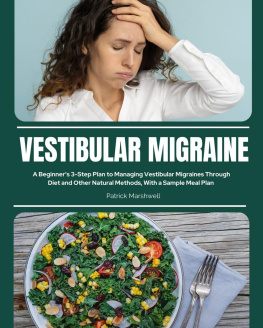Contents
Guide
Pagebreaks of the print version
The Dizzy Cook

The Dizzy Cook
Managing Migraine with More Than 90 Comforting Recipes and Lifestyle Tips
ALICIA WOLF

The information provided in this book is designed to provide helpful information on the subjects discussed. This book is not meant to be used, nor should it be used, to diagnose or treat any medical condition. For diagnosis or treatment of any medical problem, consult your physician. Publisher and author do not make any warranties about the completeness, reliability, or accuracy of the information in these pages. Any action you take upon the information in this book is entirely at your own risk. The publisher and author are not responsible for any specific health needs that may require medical supervision and are not liable for any damages or negative consequences from any treatment, action, application or preparation, to any person reading or following the information in this book. References are provided for informational purposes only and do not constitute endorsement of any sources. Be sure to check the ingredient labels before consuming any packaged or processed food.
2020 by Alicia Wolf
Photographs by Alicia Wolf, except those by Megan Weaver on the back cover and on .
Recipes by Alicia Wolf, except those by Jennifer Bragdon on
Edited by Jennifer Newens and Charlotte Beal
Indexed by Elizabeth Parson
Icons from the Noun Project: gluten-free by Stefan Parnarov; vegetarian by Karolina Bt; milk by Arthur Shlain; vegan by Adrien Coquet.
All rights reserved. No part of this book may be reproduced or transmitted in any form or by any means, electronic or mechanical, including photocopying, recording, or by any information storage and retrieval system, without written permission of the publisher.
Library of Congress Control Number: 2019950937
ISBN: 9781513262642 (paperback) | 9781513262659 (hardbound) | 9781513262666 (e-book)
Proudly distributed by Ingram Publisher Services
Printed in China
24 23 22 21 20 2 3 4 5
Published by West Margin Press

WestMarginPress.com
WEST MARGIN PRESS
Publishing Director: Jennifer Newens
Marketing Manager: Angela Zbornik
Editor: Olivia Ngai
Design & Production: Rachel Lopez Metzger
For everyone with chronic migraine and vestibular migraine disordersyou are not alone or crazy!
Contents
LIST OF RECIPES(IN ORDER OF APPEARANCE)


How I Became a Dizzy Cook
I can only imagine what youre thinking right now. Did I really just buy a migraine cookbook from some woman who is neither a neurologist nor a registered dietician? Yes, you did! And thank you for taking a chance on me. While I may not have a medical background, I am a chronic migraine patient and I like good food. I understand what it feels like to put every ounce of energy one has left into cooking a meal while dealing with a migraine attack. I know that the last thing you want is for that meal to be a disappointment and not leave you with a sense of accomplishment and pride for the effort you put into it. In addition, I know from experienceand loads of researchthat good food can help you feel better and have fewer migraine attacks.
Let me start by telling you about my journey with migraine. A few years ago, I was a normal thirty-year-old, doing thirty-year-old things. I was working hard to get promoted at my corporate job in wristwatch development. Newly married, I had just bought my first house with my husband and we were headed off on a two-week trip to Japan, Thailand, and Hong Kong. When we returned from our trip, I dove back into work immediately. At the time, my company had trimmed down my team on the development side to just me. As a result, I was constantly overwhelmed and stressed. Between the stress and not sleeping well, I started to feel sick, but I figured it was the jet lag, and I powered through.
That next weekend we flew to a wedding in Arizona and my ears were in terrible pain during the flight. I started to feel a cold coming on and I became dizzy, but I attributed it to cold symptoms. Once my cold symptoms cleared up, I started to feel better, but the slight dizziness persisted. Over the next month, my dizziness, which I describe as a lightheaded or floaty feeling, progressively got worse. My primary care doctor told me it was just stress and I needed to chill out, but I knew in my heart that this was more than just stress. At one point I was driving my coworkers to lunch and I slammed on my brakes, but the car had already been put into park. I felt as if the car was moving forward when it was perfectly still.
Not wasting more time with my primary care physician, I made an appointment with a highly rated ear, nose, and throat doctor (ENT). He ran a few tests to check my hearing and make sure I didnt have Benign Paroxysmal Positional Vertigo (BPPV), a common cause of vertigo and dizziness that occurs where calcium crystals get loose in your inner ear. Because I wasnt helped by the Epley or Dix-Hallpike Maneuvers, common techniques that help BPPV sufferers, my ENT decided that I might have Vestibular Neuritis and sent me to a dizziness center for further testing. The dizziness center ran an ENG and VNG, both designed to test balance and detect weakness in the inner ear. They found a slight weakness in my left ear, indicating Vestibular Neuritis. I was given a high dose of steroids and I faithfully attended vestibular therapy four times a week. I suddenly felt a little glimmer of hope. My balance tests were improving, and I appeared to be making progress. Then it all came crashing down. My steroid taper ended, and I was even more dizzy and disorientated than when I first began treatment. At this point, I could no longer drive safely, and looking at a computer for work made me run to the bathroom.
One night, my symptoms got so bad, I was convinced I had a brain tumor. My husband and I were having dinner, and everything began to spin around me. I couldnt keep my head up. He rushed me to the ER, where they sent me for an MRI. The results all came back normal, so my diagnosis was vertigo and they sent me home with meclizine, an anti-nausea medication. Heres one thing I wish more doctors knew: vertigo is a symptom and not a diagnosis.
Back at the dizziness center, they suspected I had a perilymph fistula, essentially a small tear in the inner ear. They suggested an experimental surgery that would render me deaf in that ear. Again, I felt in my heart this couldnt be the answer. In my last attempt to get answers, I went back to the ENT who told me there was nothing else he could do. I also saw another neurologist who insisted I was just stressed and needed to relaxthat all of this was in my head and anxiety related. Other highly recommended doctors in Dallas even turned me down as a patient after they received my lengthy paperwork.














